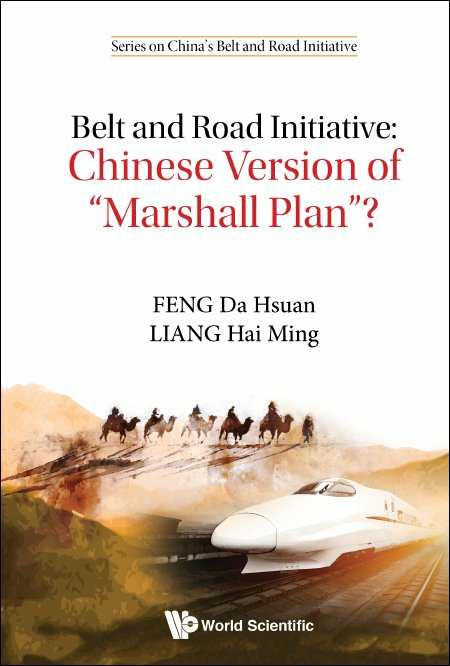由海南大学“一带一路”研究院荣誉院长冯达旋教授和院长梁海明教授合著英文版新作《Belt and Road Initiative ——Chinese Version of "Marshall Plan"?》(暂译名:“一带一路”倡议——中国版“马歇尔计划”?)一书于2019年3月由世界科技出版有限公司(World Scientific Publishing Co. Pte. Ltd)正式出版面世。

本书以前所未有的视角展望了“一带一路”(BRI)的发展前景,这是中国在21世纪一项大胆而全方位的全球性计划。“一带一路”倡议可以概括为中国古代陆地和海上丝绸之路的“复兴”,应当指出,它正是基于普适的经济学原理对中国和世界产生影响,以及中国如何在21世纪转变思想。
“一带一路”虽然由中国倡议,但其实从一开始就是“多对多”的努力。这样多国家多地区的协作计划,与“一对多”的马歇尔计划迥然不同。本书两个章节包含着意味隽永的定义,“普适经济学:‘一带一路’倡议的基础架构”和“超大陆,新文艺复兴和文化交流:“一带一路”倡议引发的千年理念转变”,使得本书对“一带一路”的讨论独树一帜。在今天,全球对此的讨论还完全局限于地缘政治和经济领域的态势下,本书为中国提出的长期而深刻的“一带一路”倡议提供了新的视角。
作者冯达旋教授是美国得克萨斯大学达拉斯分校前分管科研与经济开发的副校长,海南大学国际顾问委员会主席,中国丝路智谷研究院首席顾问。丝路智谷研究院为顶尖社会智库,在南京大学及光明日报社联合发布的中国社会智库最新排行榜中排名第三。自2007年以来,冯教授曾在许多关于高等教育的国际研讨会,论坛和会议上发表主题演讲,也深入参与了“一带一路”倡议领域的各个方面,仅在过去的一年里,冯教授在全球范围内发表了10多场主题演讲。冯教授也为中国日报,环球时报,英国的金融时报中文版,香港大公报和南华早报,新加坡的海峡时报和联合早报以及泰国《国家报》等国际媒体撰写社论。他著有《Edu-renaissance: Notes from a Globetrotting Higher Educator》一书,中文版《全球高等教育复兴》。
本书另一位作者梁海明教授是丝路智谷研究院院长,美国普林斯顿大学访问研究合作者(2018—2019),首届“一带一路”国际合作高峰论坛参会专家代表,“文明之光?2016中国文化交流年度人物”获得者。英国《金融时报》中文网财经专栏作家,中国中央电视台财经评论员。连续三年(2016、2017、2018)梁教授被由中央推进“一带一路”建设工作领导小组办公室指导,国家发改委国家信息中心推出的《“一带一路”大数据报告》列为“一带一路”最具影响力的30名专家学者榜单中,也是中国华南地区唯一的一名上榜学者。其近著有《一本书读懂“一带一路”》《“一带一路”经济学》《你不知道的财经真相:美国退出QE之后的世界》等,与亚投行行长金立群、世界银行前高级副行长林毅夫等人合著有《“一带一路”引领中国:国家顶层战略设计与行动布局》著作,以及《“一带一路”:香港再起飞的最后一次机会?》等。梁教授主要研究领域包括“一带一路”、宏观经济、粤港澳大湾区、自贸区等。
海南大学作为一所坐落在海上丝绸之路重要支点处的重点高校,立足学科特色和自身优势为海南参与“一带一路”建设提供人才支持和智力支撑,《Belt and Road Initiative ——Chinese Version of "Marshall Plan"?》作为海南大学“一带一路”研究院的首部且是英文版作品,其付梓成书意义非凡,标志着海南大学在“一带一路”研究中的全球化视野和学术研究原创成果上的重大突破。
//www.hainanu.edu.cnHainan University issues its first book on BRI
A book called The Belt and Road Initiative – the Chinese Version of the 'Marshall Plan'? was recently issued by World Scientific Publishing Co Pte Ltd.
It was written in English by Feng Da Hsuan, honorary president of the Hainan University Belt and Road Research Institute, and the dean of the institute, Liang Haiming.
The book views the Belt and Road Initiative (BRI), a bold and all-encompassing 21st century global effort by China, with unprecedented perspectives.
According to the book, the BRI could be summarized as a 'revitalization' of China's ancient land-based and maritime silk roads, but it should be noted that its impact on China and the world stands on the foundation of omnipresent economics and how China transforms its mindset in the 21st century.
Though initiated by China, the BRI's implementation has been a many-to-many effort from the very beginning. This multi-regional and multi-national effort is distinctly different from the one-to-many nature of the Marshall Plan.
Two chapters of the book – “Omnipresent Economics: The Belt and Road Initiative Underpinning” and “Supercontinent, Neo-Renaissance and Cultural Communications: The Millennium Mindset Transformations Induced by the Belt and Road Initiative”, make it abundantly clear that the BRI discussions presented are unique.
The book’s treatment of today's global discussions and debates, which are entirely confined to geopolitical and economics arenas, could shed new light on the BRI, a long-term and profound initiative by China.
Feng Da Hsuan, Vice President for Research and Economic Development of the University of Texas at Dallas, is the Chairman of the International Advisory Board of Hainan University and Chief Adviser of China's Silk Road iValley Research Institute.
The China’s Silk Road iValley Research Institute is ranked the 3rd among all think-tanks of China, according to a survey made by Nanjing University, Guangming Daily Press and others.
Feng has made keynote speeches at international seminars, forums and academic conferences on higher education and has been deeply engaged in various aspects of the Belt and Road Initiative since 2007.
He delivered more than 10 keynote speeches worldwide in the past year. In addition, he also wrote editorials for China Daily, Global Times, the Financial Times (Chinese edition), the Hong Kong Takungpao and South China Morning Post, Singapore’s The Straits Times, Lianhe Zaobao of Singapore and Thailand’s The Nation.
He is the author of Edu-renaissance: Notes from a Globetrotting Higher Educator and its Chinese version.
Liang Haiming, the other author, is Chairman of the China Silk Road iValley Research Institute and a visiting scholar at Princeton University for 2018-2019.
He was invited by the Chinese government as one of the few Chinese experts in the first Belt and Road Forum for International Cooperation in 2017 and honored as “Light of Culture -- Person of the Year 2016 for Cultural Exchange between China and the World”.
Liang, from South China, is a columnist for the Financial Times (Chinese edition) and a Financial Commentator for China Central Television and has been listed as one of the top 30 influential Chinese scholars and experts by central governmental departments for three consecutive years, from 2016 to 2018.
His recent publications include A book on the Belt and Road (yibenshu dudong “yi dai yi lu”), Belt and Road Economics (“yi dai yi lu” jingjixue”), Financial Truth You Don't Know: the World after the US Quiting Quantitative Easing, Belt and Road Leads China: National Top-level Strategic Design and Action Deployment (co-authored with Asian Infrastructure Investment Bank President Jin Liqun and former Senior Vice President of the World Bank Justin Lin Yifu).
The Belt and Road Initiative, macroeconomics and the Guangdong - Hong Kong-Macao Greater Bay Area and free trade zone are the focuses of his research.
As a key university situated on a fulcrum of the 21st Century Maritime Silk Road, Hainan University has made its own contribution to the Belt and Road construction with its strengths in talents and research. The book, the first of its kind from the university and with its global perspective and high academic value,marks a major breakthrough in the university’s original research on the Belt and Road Initiative.
//www.hainanu.edu.cn
 公安部备案号:46010802000190 Copyright © 2024 hainan university
公安部备案号:46010802000190 Copyright © 2024 hainan university




